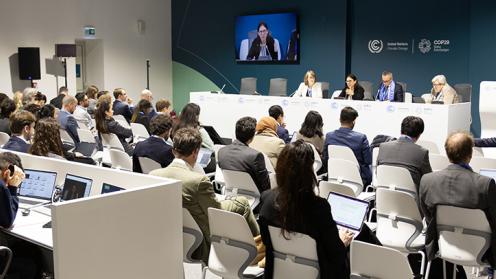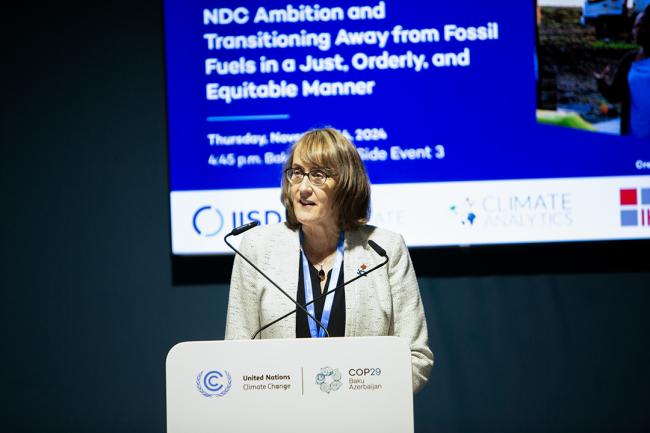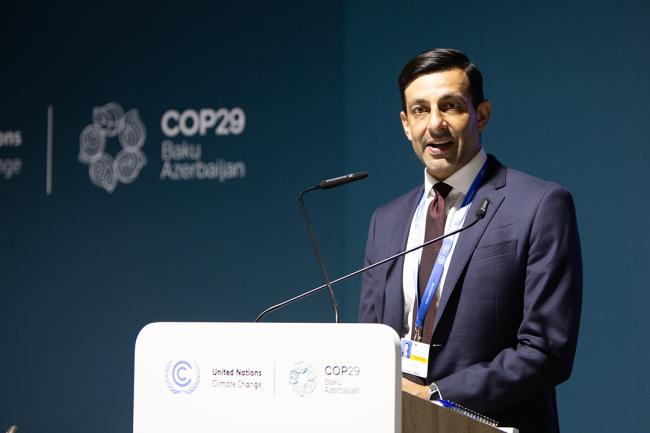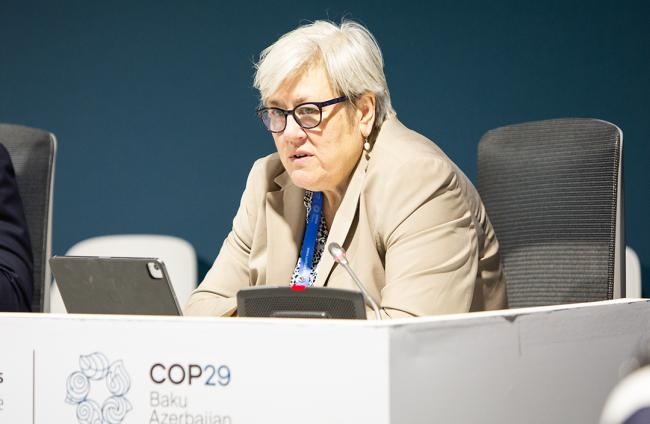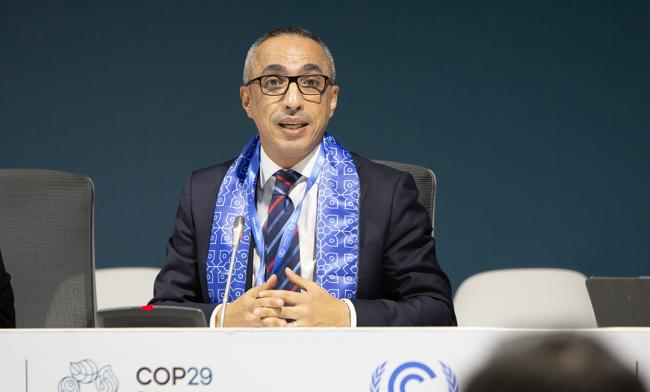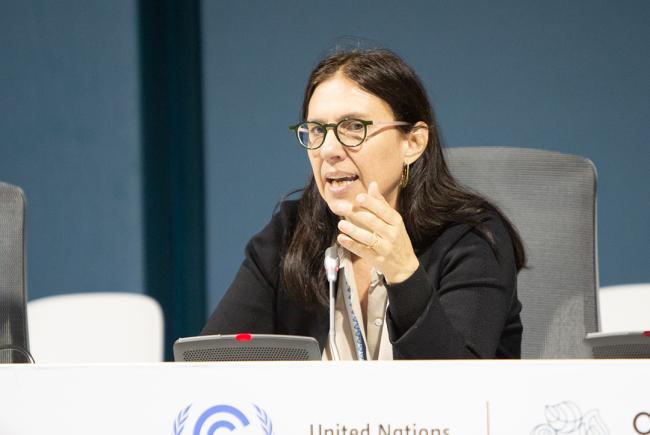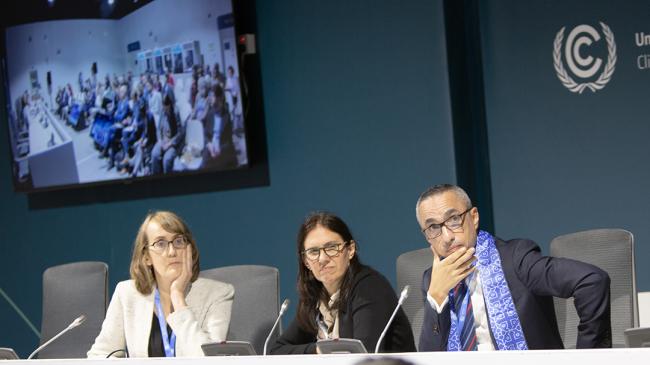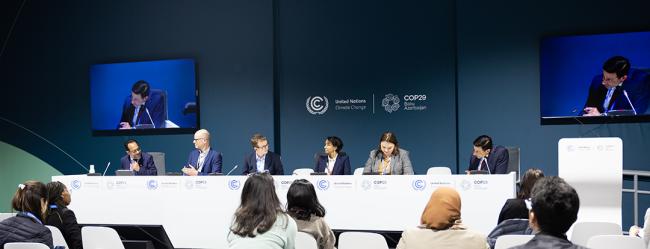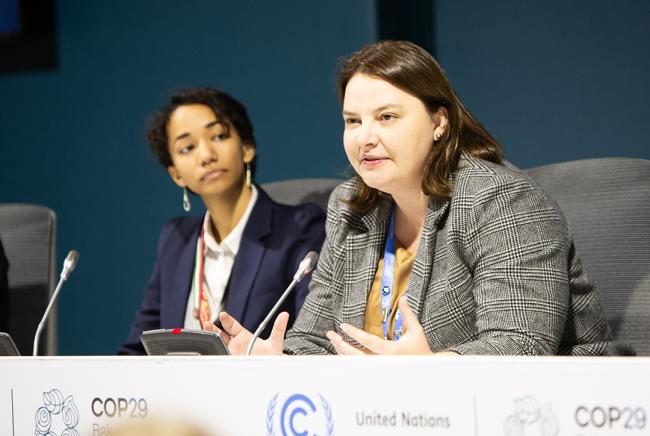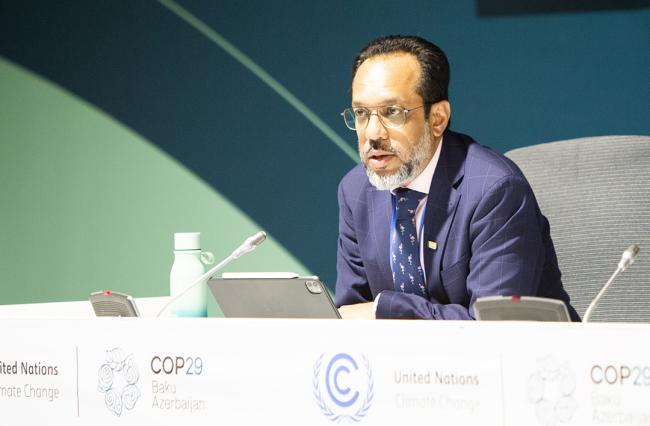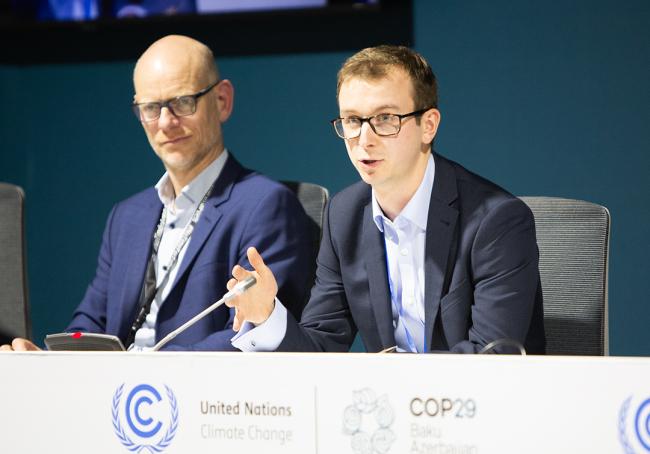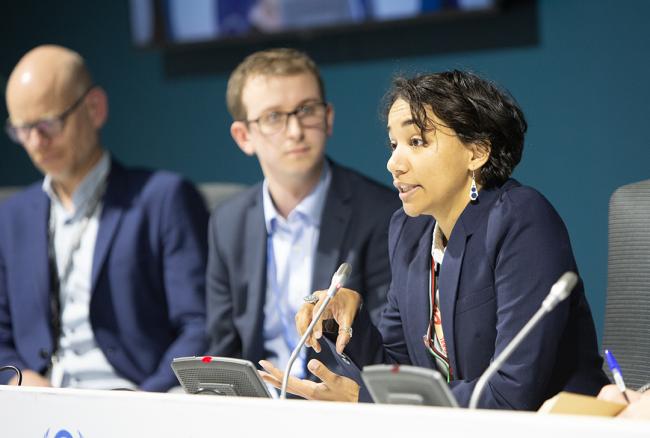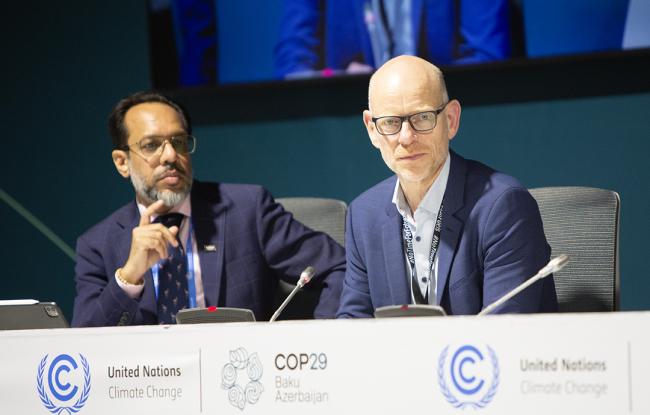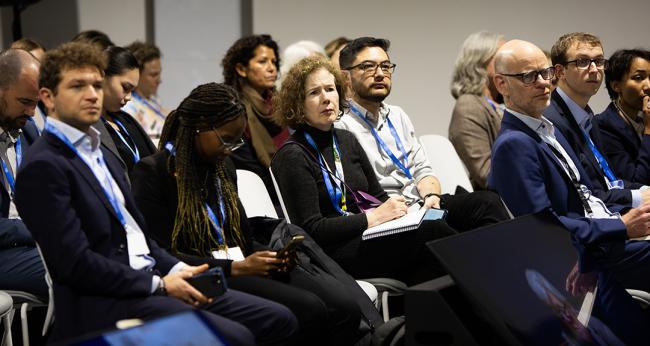About
With the February 2025 deadline for “third generation” Nationally Determined Contributions approaching, a side event tackled turning COP 28’s Global Stocktake decision on phasing out fossil fuels into reality, focusing on overcoming obstacles while ensuring a just transition.
The first Global Stocktake (GST), concluded at COP 28 in Dubai underscored the critical need to transition away from fossil fuels, marking a decisive moment in the global response to climate change. This decision highlighted the imperative of accelerating efforts to phase out fossil fuels and scale up renewable energy, aligning with the objectives of the Paris Agreement. One of the most significant opportunities to act on this decision was through the next phase of "third generation" Nationally Determined Contributions (NDCs) which set targets through 2035. As these are due for submission in February 2025, this event provided a timely discussion of what countries are doing to ensure a just transition away from fossil fuels and barriers they are facing. Farooq Ullah, International Institute for Sustainable Development (IISD) moderated the event.
After a video by JUST Stories, an initiative led by the Institute for Human Rights and Business, which showcased definitions of just transition by communities in Western Australia, Patricia Fuller, President and CEO, IISD, offered opening remarks. She emphasized that turning the agreement in Dubai into tangible outcomes is critical, particularly as the world approaches the deadline for submitting “pivotal” third-generation NDCs that map out a fair, equitable shift over the next decade, aligning national commitments with the scientific mandate for decarbonization. Yet, despite this clarity, Fuller stated, many major fossil fuel producers continue to plan for expanded exploration and extraction in the coming decades. She called for strengthened NDCs that commit to no new fossil fuel exploration and set explicit, ambitious target dates for reducing production, starting with countries that are best placed to lead in line with the principle of common but differentiated responsibilities.
In a first high-level panel chaired by Fuller, Rachel Kyte, Special Representative for Climate, UK, stressed the UK, following a change in government since COP 28, is firmly committed to climate goals and has already cut emissions by 53% between 1990 and 2023. She also highlighted the UK’s status as the first G7 country to exit coal generation. Acknowledging significant challenges like energy poverty and household costs, she emphasized that energy transition underpins the nation’s competitiveness. The UK has created a clean energy jobs office, she said, prioritizing collaboration with communities and trade unions to ensure a smooth, localized transition process.
Riad Meddeb, UN Development Programme (UNDP), said the third NDC cycle is a critical opportunity to strengthen energy targets. He explained the UNDP-led Climate Promise, launched in 28 countries, focuses on three levels: ambition, supporting 2025 NDC targets; acceleration, mobilizing public, private, and international finance; and inclusivity, empowering women, Indigenous Peoples, and youth as climate leaders. Highlighting the World Bank’s and the African Development Bank’s (AfDB) Mission 300 initiative to provide electricity access to 300 million people, he stressed the need for innovative financing.
Mariana Panuncio-Feldman, NDC Partnership, said the third round of NDCs must reflect governments’ commitments while evolving based on lessons from earlier cycles, underscoring the NDC Partnership supports 180 countries in this effort. First, she noted, they must be ambitious, aligning with the Paris Agreement's mandate for progression. This requires not just improved overall targets but also sector-specific commitments that send clear political signals and drive policy development. Second, she continued, the quality of NDCs must improve through better data, ensuring reliability. Third, NDCs must be implementable, with clear measures and strong ownership across key ministries. Lastly, she concluded, mobilizing finance is crucial, including costing proposals that attract investment and address just transition needs, creating jobs while mitigating stranded assets.
In a second round of questions on distinct barriers to advancing the transition away from fossil fuels, Kyte emphasized domestic challenges, including the need to balance ambitious climate commitments with economic realities. Meddeb noted that balancing energy security, affordability, and access is a major barrier, when 1.18 billion people worldwide face energy poverty. Panuncio-Feldman underscored the need for tangible progress on finance goals, ensuring countries feel supported in their fossil fuel transitions.
A Q&A then discussed the significance of the timeline for the third round of NDCs, which runs from 2030 to 2035, for the 1.5°C target, as well as pathways to build public trust in renewable energy, including by looking at regulatory environments.
In a second technical panel moderated by Ullah, panelists discussed challenges and opportunities to meet deadlines and ambitions for transitioning away from fossil fuels at the country level.
Niklas Höhne, Managing Director, NewClimate Institute, emphasized that current climate commitments fall short. While emissions remain high due to new fossil fuel infrastructure, renewable energy is growing rapidly, demonstrating faster-than-expected potential for emissions reductions. However, outdated NDCs hinder progress. He stressed that achieving 1.5°C is only possible if urgent changes are made before 2030.
Natalie Unterstell, President, Talanoa Institute, provided a mixed assessment of Brazil’s NDC. She praised commitments to halt deforestation and develop sectoral plans, including carbon budgets. However, she also pointed to inadequate mitigation targets, noting a lack of explicit deadlines for transitioning from fossil fuel production and exports.
Arunabha Ghosh, CEO, Council on Energy Environment and Water (CEEW), emphasized the importance of aligning NDCs with local realities. He highlighted India’s LiFE initiative for behavior change and modeling scenarios integrating urbanization, economic shifts, and demand-side measures to maximize renewable energy opportunities. He underscored the need for granular planning, emphasizing distributed energy systems, which can create jobs and empower communities.
Neil Grant, Climate Analytics, highlighted renewables as the fastest way to accelerate climate ambitions. He underscored the importance of translating GST findings into local actions and phasing out fossil fuels across all sectors. He welcomed a recent study’s findings that several countries are on track to build sufficient capacity in renewables, such as China, Brazil, and Germany.
Fatima Eisam-Eldeen, Leave It in the Ground (LINGO), then presented her organization’s “toolbox” for helping countries leave fossil fuels in the ground, including through debt restructuring, decommissioning subsidies, and bilateral agreements. She stressed, however, that countries have different needs according to their circumstances, and that these mechanisms aim to support developing countries to secure necessary funding.
In response to a second round of questions on more positive trends, Höhne noted significant progress in renewable energy and electric mobility across individual countries. Unterstell pointed to Brazil’s bold commitment to eliminating deforestation. Ghosh highlighted India's efforts in distributed renewable energy, which empower rural communities, create livelihoods, and support local economies. Grant emphasized the need for pairing renewable energy expansion with clear phase-out dates for fossil fuels, advocating for supply-side policies and phased transitions that ensure a balance between energy sources. Eisam-Eldeen stressed the role of public finance in addressing funding gaps, enabling incentives for private investment, and fostering international solidarity.
Noting the continuing obstacles to the transition away from fossil fuels, Ullah stressed that “If there is opposition to what we do, it must mean we are on the right track.”
Organizer: IISD
Contact: Aia Brnic I abrnic@iisd.org
Website: https://www.iisd.org/topics/energy
